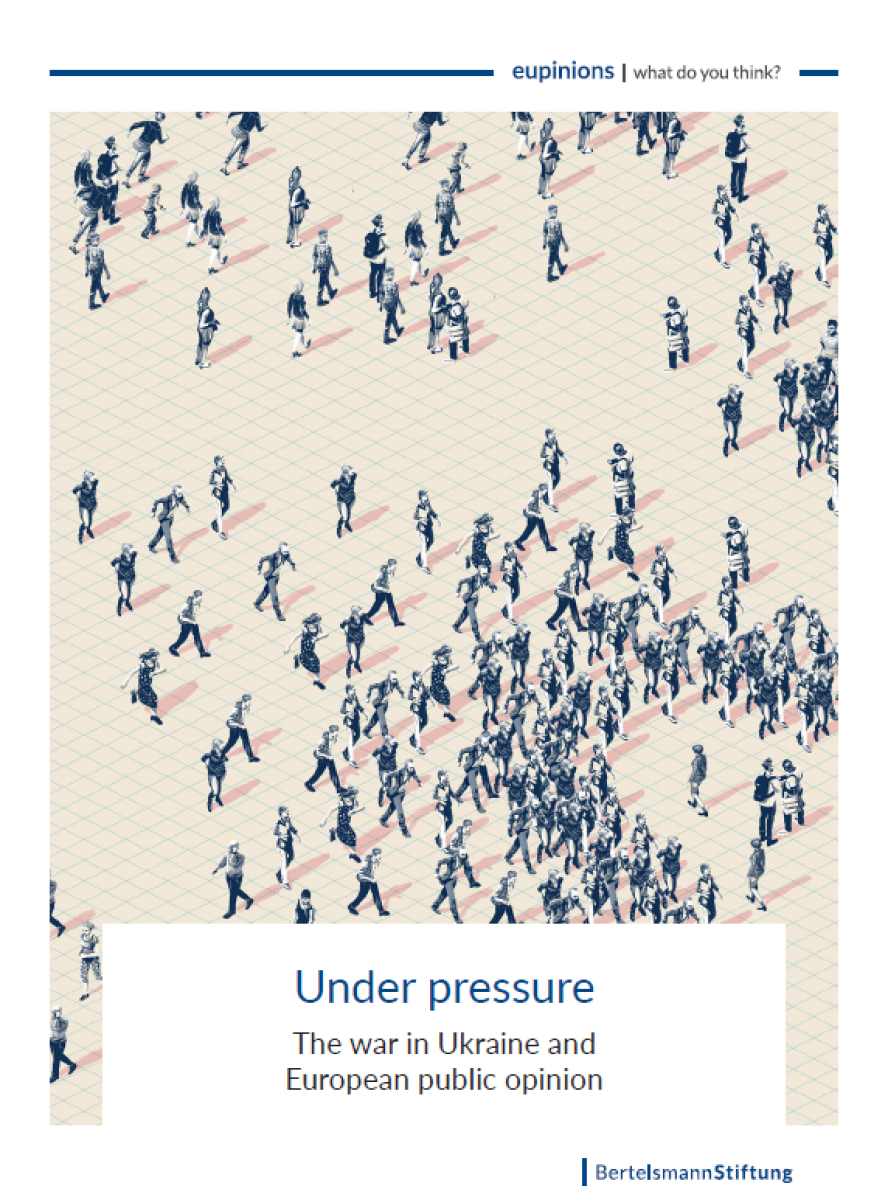Europeans’ support for Ukraine is declining slightly

A large majority of EU citizens continue to support admitting Ukraine to the European Union. Their willingness to take in Ukrainian refugees also remains strong. However, approval for sending arms to Ukraine is declining slightly in all EU states; in Germany, it has slipped below 50% for the first time since the war began.
Across Europe, 50% of respondents said their countries should support Ukraine by providing it with arms shipments, thus allowing it to defend itself against Russian attacks. In March, shortly after the war began, this EU-wide figure was 56%. In Germany, however, the level of public approval for arms transfers fell below 50% in September (to 48%, down from 57% in March). This rate is lowest in Italy, at 36%. By contrast, approval for such activities has remained at a consistently high level of 76% in Poland, Ukraine’s direct neighbour. These are the findings of an EU-wide survey conducted in September by eupinions, the Bertelsmann Stiftung’s European opinion research tool, and published in cooperation with the King Baudouin Foundation. The survey provides data on the EU as a whole, as well as for seven of its 27 member states: Belgium, Germany, Spain, France, Italy, the Netherlands and Poland.
There has been concern that the public’s willingness to accept personal sacrifices in order to become independent of Russian energy imports would weaken over time. However, this effect has been much less marked than some experts had feared. Across the EU, a clear majority of 67% said the EU should become more energy independent even if this means higher costs. In March, this figure was 74%. As in surveys conducted in March and June, Germany shows the EU’s lowest national-level result on this question, at 62%. Overall, eupinions has recorded a decline of 10 percentage points in Germany since March on this issue. At 80%, the willingness to bear additional personal costs in the drive for energy independence is highest in Poland. Belgium recorded the sharpest drop in this area, showing a decline of 12 percentage points (March: 76%, September: 64%). “This development was to be expected in view of the continuation of very high inflation rates and the start of the heating season. It should continue to be monitored, as it holds the potential to generate political conflict,” says Isabell Hoffmann, a Europe expert at the Bertelsmann Stiftung and head of eupinions. “However, the end of summer has not meant the end of solidarity with Ukraine.”
Rising cost of living is Europeans’ main concern
Asked what worried them most at the moment, respondents showed just how strongly inflation is weighing on minds. A total of 49% overall cited the rising cost of living as their main con-cern, with this figure rising to 51% in Germany. Spaniards have fewer concerns in this respect - only 39% said rising costs were their main concern.
More than three quarters of the Europeans surveyed said they are ready to accept Ukrainian refugees in their own countries. The extent of this openness is greatest in Spain – and has been so consistently since the first survey on the issue in March. A total of 89% say their country should accept refugees. Across the EU, 77% are still of this opinion. In Germany, this level of willingness has declined since March (86%) to 74% in September. The lowest level can be seen in France, with 72%. The public level of willingness to accept refugees has fallen by 12 percentage points in both countries.
Clear majority supports the admission of Ukraine to the European Union
There is still a clear majority in favour of admitting Ukraine to the European Union. Just under two thirds of respondents indicated support, six percentage points less than in March. The level remains highest in Poland (82%), followed by Spain (78%). In contrast, Germany shows the greatest degree of scepticism. Here, the majority in favour of accession has shrunk to just 55% (down from 61% in March).
With levels of support consistently above those seen for any other question on this survey, Europeans agree that the EU needs a common defence policy. Nearly 90% of respondents in the EU agree with this statement. Almost 80% of Europeans also say they are in favour of the EU taking a more active role on the world stage. The levels of support for these statements differ only slightly from one country to another. “Since Russia’s attack on Ukraine, traditional defence policy has once again become very popular,” Hoffmann said. “Europeans recognise the importance of a common strategy to deal with major crises. This applies not just to financial, economic, and health crises, but to security crises as well.”
Additional information
eupinions is the Bertelsmann Stiftung’s European opinion research project, developed jointly with Dalia Research. The programme regularly surveys citizens from all EU member states on issues of European importance. The surveys referenced in this analysis took place in March, June, and September 2022 across the EU. With sample sizes of 13,208 (March), 13,220 (June) and 13,204 (September), they are representative of the EU as a whole as well as of seven member states: Belgium, Germany, Spain, France, Italy, the Netherlands and Poland. Detailed information on the survey’s methodology can be found in the publication.
About the Bertelsmann Stiftung. Inspiring people. Shaping the future.
The Bertelsmann Stiftung is committed to enabling social participation for everyone – politically, economically and culturally. Our programs include Education and the Next Generation, Democracy and Social Cohesion, Digitalization and the Common Good, Europe’s Future, Health, and Sustainable Social Market Economies. In our work, we focus on people, since only they can change the world and make it better. We share knowledge, promote expertise and develop solutions. A nonprofit foundation, the Bertelsmann Stiftung was established in 1977 by Reinhard Mohn.